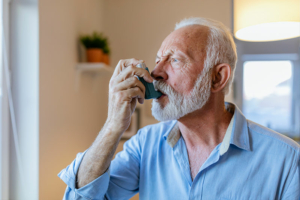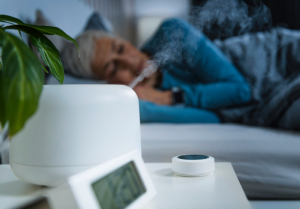Understanding and Managing COPD Comorbidities

Managing COPD comorbidities is easier with these expert tips.
Watching an older loved one manage the daily challenges of COPD is not easy. You see them struggle with breathlessness and fatigue, and you want to do all you can to help. What you might not realize is that COPD often brings along other health conditions, known as comorbidities. Managing COPD comorbidities in tandem with COPD requires first learning about them, and then supporting and advocating for the person to stay on top of necessary screenings and treatments.
Below are a few of the most common COPD comorbidities:
- Problems With Sleep. Problems with sleep, including obstructive sleep apnea (OSA) and insomnia, are common in people with COPD. These conditions can lead to fragmented sleep, further contributing to fatigue and decreased quality of life. Management strategies may include the use of continuous positive airway pressure (CPAP) machines, lifestyle modifications, and sometimes medications to boost sleep quality.
- Anxiety and Depression. Mental health conditions, particularly anxiety and depression, are common among individuals with COPD. The chronic nature of the disease, the physical limitations it imposes, and the fear of breathlessness can all contribute to psychological distress. It’s essential for health care providers to routinely screen for these conditions and offer appropriate interventions like counseling, medications, and support groups to help the person manage their mental health alongside their COPD.
- Lung Cancer. COPD significantly increases the likelihood of developing lung cancer. The shared primary risk factor of smoking is a substantial contributor, but COPD itself is an independent risk factor due to chronic inflammation and damage to lung tissue. Regular screenings for lung cancer, specifically in smokers and former smokers, are crucial for early detection and improved outcomes.
- Gastroesophageal Reflux Disease (GERD). GERD, a digestive disorder where stomach acid frequently flows back into the tube connecting the mouth and stomach, is often found in individuals with COPD. The chronic coughing associated with COPD can exacerbate GERD symptoms, and vice versa. Effective management includes dietary adjustments, medications to reduce gastric acid, and lifestyle changes like elevating the head during sleep.
- Diabetes. Diabetes is yet another condition frequently seen alongside COPD. The link between the two is thought to be associated with systemic inflammation and the impact of corticosteroid use, common in COPD treatment, on blood sugar. Managing diabetes requires close monitoring of blood glucose levels, dietary adjustments, and sometimes adjustments in medication to make certain both conditions are properly controlled.
- Osteoporosis. Osteoporosis, characterized by weakened bones, is common in people with COPD. Factors contributing to this include long-term use of corticosteroids, decreased physical exercise, and systemic inflammation. This raises the risk of fractures, complicating the person’s health. Preventive steps include bone density screenings, calcium and vitamin D supplementation, weight-bearing exercises, and sometimes medications to strengthen bones.
- Cardiovascular Diseases. One of the most common comorbidities your loved one might face is cardiovascular disease. People with COPD are at a higher likelihood of developing conditions like hypertension, heart failure, and ischemic heart disease. The reasons for this greater risk include shared factors like smoking, systemic inflammation, and the strain that reduced oxygen levels put on the heart. Regular cardiovascular examinations and proactive management of heart health are vital for their well-being.
How Responsive Home Care Can Help
If someone you love is managing COPD and its comorbidities, Responsive Home Care is here to help. Our trained and experienced care team is a key component of a better quality of life for seniors with chronic health conditions. Reach out to us today at 954-486-6400 to schedule a free in-home consultation to learn more about our in-home care services in Fort Lauderdale, Plantation, Hollywood, and throughout Broward County.

 It began with those in your inner circle, and it has gradually been spreading outward to friends and acquaintances. Discussing a COPD diagnosis and knowing how to reply to the various questions that arise about it could be uncomfortable – for you personally, and for those you are speaking with as well.
It began with those in your inner circle, and it has gradually been spreading outward to friends and acquaintances. Discussing a COPD diagnosis and knowing how to reply to the various questions that arise about it could be uncomfortable – for you personally, and for those you are speaking with as well.
